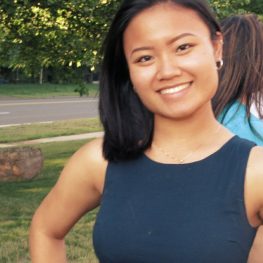
Asia Hutchins, graduating this year with a degree in Family and Juvenile Justice and Clinical/Community Psychology, has dedicated her time to sup-port juvenile justice reform in a variety of ways. In addition to being a Juvenile Justice Intern with the Tow Youth Justice Institute (TYJI), Asia is a Peer Wellness Educa-tor- UNH DV/SA Prevention and Aware-ness, is the Executive Assistant- Alpha Tau Criminal Justice Honors Society, is a CSA Intern – New Haven City Hall (Community Services Administration Office), and serves on the Juvenile Justice Advisory Committee (JJAC). We recently asked Asia about her experiences with her courses and working with the TYJI.
What was your deciding factor to study in the field of juvenile justice?
When people usually talk about the criminal justice field, it is normally within the realms of policing, national security, or investigative services. However, I believe studying family and juvenile justice was the right choice for me because I’ve always been interested in working with young people. Learning about juvenile justice and all the reform currently taking place (both in CT and nationally) as a young adult myself gives me what I believe to be a unique and important perspective when it comes to JJ reform.
On top of being a criminal justice major, you’re also receiving your degree in psychology. How do you feel that these two majors will coincide with one another?
Criminal justice and psychology overlap on so many levels. There are different “schools of thought” and theories in both criminology and psychology. Some schools focus on the macro level (i.e environmental criminology, com-munity psychology) and others on the micro level (i.e. rational choice theory, clinical psych) and whether it be criminology or psychology, there are different explanations and theories that parallel or mirror one another. When we study why people commit crimes (or don’t commit crimes!), there are so many lenses we can analyze the situation with. Both the criminological perspective and the psychological perspective are unique and when used together can enrich analyses of criminal justice issues.
How do you feel working with the Tow Youth Justice Institute has helped you prepare for a role working in the field after your graduation?
Working with Tow has been an eye-opening experience. I’ve helped work on several different projects on various different levels ranging from event plan-ning, research and programming. I think that this diverse work experience will certainly allow me to go into any kind of work force with some background experience.
You will be working with the City of New Haven on YouthStat as part of a University Cooperative Work Experience. What are you hoping to accomplish during your time with the department?
I am actually working at the Community Services Administrative Office which encompasses a plethora of different departments ranging from offender reentry under the Fresh Start Program, Youth Services, to Homelessness, etc. I hope to gain more knowledge on the administrative level but I also feel this Co-op allows me to work more one-on one with individuals from the city of New Haven. The beginning of my student/professional career has thus far consisted of administrative kind of work (programming, research, communi-cations, clerical) and I have loved every step of it! However, I would like this experience to expose me to the other side of the “desk” so to speak and allow me to help people through social services/ direct services.